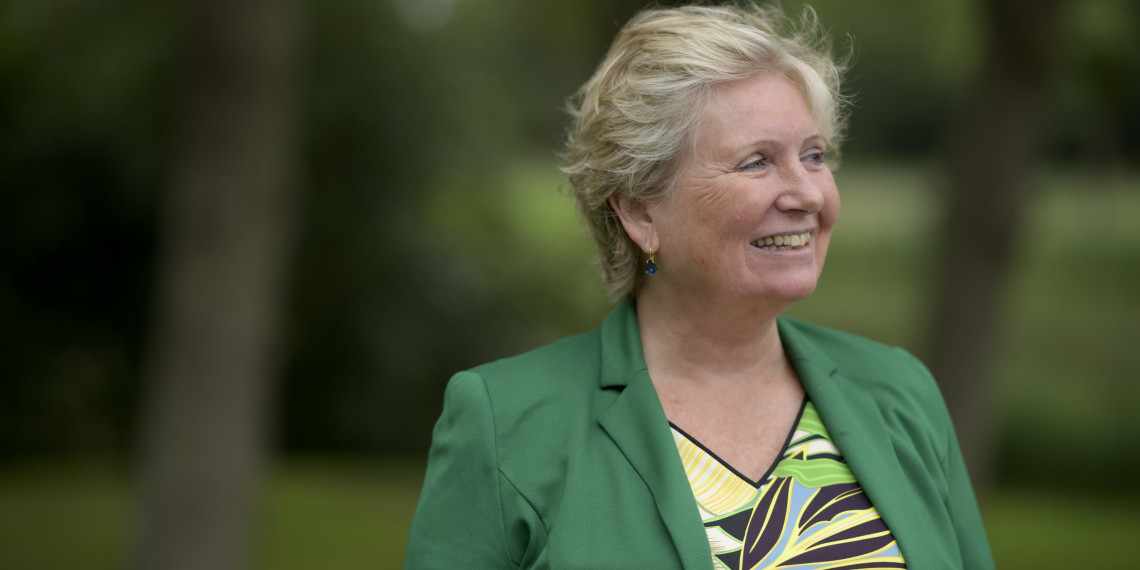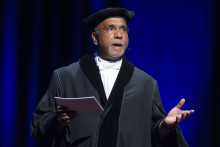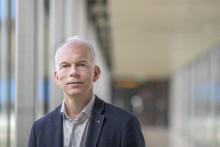‘It is and was a unique experiment…’, is how Lisette van Gemert announced her farewell symposium via email. Coming Friday she will mark an end to her career at the UT after 37 years of service. However, the mark resembles one of change rather than an end. More on that later. What she means with that unique experiment? ‘The one in the forest, the campus’, she says in her office in Cubicus. ‘I’ve known this place for over fifty years, since I went to high school not far from here. Those early days were a very fun experiment in the forest. The campus was really unique for its time… Studying, living and recreation in one environment, that was more reminiscent of a campsite or workshop. Everybody was freely dabbling around.’
Explaining clearly
Although she was captivated by the charms of the then titled THT, she chose to study linguistics (phonetics) at the University of Groningen instead. She started working at the THT in 1985, when she was approached by the applied linguistics department. ‘That was incredibly fun, I was going all around campus to teach engineering students. This mainly stemmed from the premise: If you create or design something, how do you clearly explain how it works? That is something which many engineers struggle with.’
She continued that line of reasoning when the applied communication studies programme started in 1998. ‘An achievement from Erwin Seydel and Egbert Woudstra. Our own programme with our students. At that point you also need your own lecturers, of course. I was then given the opportunity to do a PhD.’ This happened in 2003, shortly after the building she worked in - now Cubicus - partly burned down. Her work was fortunately spared.
Van Gemert focused on ‘internal and external communication’ within organisations such as chemical companies, including AkzoNobel. ‘It mainly regarded safety standards and manuals in the context of corporate responsibility. In practice, however, no one understood the document they were signing.’ Soon, her attention shifted to healthcare, where she found a similar situation. 'That was also at the time when HIV was a significant problem. There were all sorts of protocols and documents going around, but healthcare staff didn't know where to look for it, with a myriad of risks as a consequence.'
'We constantly commanded attention and thus gained our legitimacy'
eHealth
Her work at hospitals was the prelude to eHealth, the discipline she has immersed herself into since, eventually becoming a professor of Persuasive Health Technology in 2015. ‘It was a rapidly emerging field, I wanted to do something with that.’ So she founded the Centre for eHealth & Wellbeing Research in 2005. ‘That is perhaps what I am most proud of. Starting such a centre actually wasn’t allowed at all. But we continuously commanded attention and thus gained our legitimacy.’
The efforts were noticed and picked up on. Van Gemert sought collaboration with German institutions and the Canadian University of Waterloo. ‘Research funding poured in as a result, also for creating a secure digital environment in which general practitioners could communicate with their patients, instead of via e-mail. At one point we started offering a Massive Open Online Course eHealth with thousands of participants.'
Her efforts were also reflected in a recent and special project that many will remember without a doubt: the CoronaMelder app. She studied how users interacted with the app. ‘Although the biggest mistake was to call it an app in the first place, it was more like a silent monitor. Still, I found it incredibly interesting to witness. On the one hand, I saw that fear ruled and that ministries looked at each other. On the other hand, I thought it was a great initiative, which unfortunately was not fully embraced - also because of the problems. The German corona app, for instance, was better.’ Van Gemert is convinced, though, that technology like the CoronaMelder has a future. 'Especially when looking at lifestyle changes. It's incredibly difficult to make behavioural change happen. But if we combine people's findings with the data they collect, you can look at adaptive interventions – such that you can give someone just the right push in the right direction at the right time.'

During the presentation of the corona app.
Ambassador
Formally, she was already an emerita two years ago. But since no successor had been found at that time, she appended her career by two years. Even though this week's symposium marks an official retirement, there is no question of an actual farewell for the time being. ‘I still supervise 14 PhD students; a network is not transferred with the flick of a switch. And I am happy to remain available to chair PhD ceremonies, as I really enjoy doing that. I will undoubtedly become more and more part of the UT's outer shell, but I will always feel like an ambassador.’
‘In Twente we never designed for the people, we designed with them’
According to her, the university could gain prominence. ‘Internationally all is fine, but it’s different here in the Netherlands. We need to communicate that we have something unique here in a better manner. Something that the other - technical - universities don't have.’ That something, she says, can be found in the combination between engineering and social sciences. ‘Call it multidisciplinary design if you will, or socio-technical design. Here, we have been doing that for years; we connect engineers, designers, behavioural scientists and users. Because we know like on other that technology is not just a thing, but initiates a process of change, framing a new reality. Only in the past few years have funders like ZonMw and NWO [research councils that provide subsidies, ed.] seen the added value of this, including it in their assessment of research proposals. But in Twente we never designed for the people, we designed with them.'
Raison d’être
The professor emerita signals caution regarding the bond between the university and the region. ‘It is so incredibly important for the survival of this university. We should put more effort into seeking out and emphasise our regional significance. In the past, at the time of The Entrepreneurial University, that was much more present.’ Van Gemert states she saw that bond ‘dilute’. ‘I think that to a considerable extent, this can be attributed to the rapid internationalisation of the UT. As a result, we also lost some of your individuality, whereas we should be displaying said individuality. In a way, we have increasingly become a normal university, with mainly the support staff coming from the region. That puts pressure on our raison d’être.’
‘The UT may have become internationalised, but the same does not apply to the Dutch healthcare system’
There is an additional concern at play, with regard to healthcare in particular, according to Van Gemert. ‘Take human-related research in regional hospitals, for example. A student from India who can't speak a word of Dutch, who has to talk to a patient from Twente... That simply doesn’t work. Such an interaction with a patient cannot be done via Google Translate. Language is such an incredibly important tool, in all its facets, subtleties and nuances, apart from the fact that you need to understand a country's entire healthcare system from start to finish. The UT may be internationalised, but the same does not apply to the Dutch healthcare system. If we continue on this path, I fear we will lose an entire form of research.’

Keep experimenting
Van Gemert is still overflowing with ideas and energy. ‘As far as I'm concerned, if there is one thing that we as a university could set up it would be a centre for artificial intelligence; to address not only the technical side, but also the implications for humans and society.’ It brings her to the subject of missed opportunities. ‘First of all, it is a pity that the cooperation with Münster has shrunk so much. On the topic of uniqueness... this university should not hyperfocus on the west, when along the border with the east we have a hinterland of forty million people and universities like Münster, Oldenburg and Bielefeld. And internally, I find it such a shame that we did not get the cooperation with ITC off the ground. It has already been eight years ago since we sought each other out in the field of GeoHealth. But due to lack of support and momentum, that didn't get off the ground.’
Being full of energy, she will continue for as long as she feels welcome on campus. ‘I currently have a zero-hour contract. There is a policy for retirees. However, this is mainly focused on phasing out for the time being, not on: what can these people still mean for the university? It would be wonderful if the UT would make a different policy on that. Look, I have now reached a point where when I walk around on campus, I tend to look back rather than forward. But for now, I don't feel like an outcast. I'm happy to keep experimenting in this forest for a very long time.'








